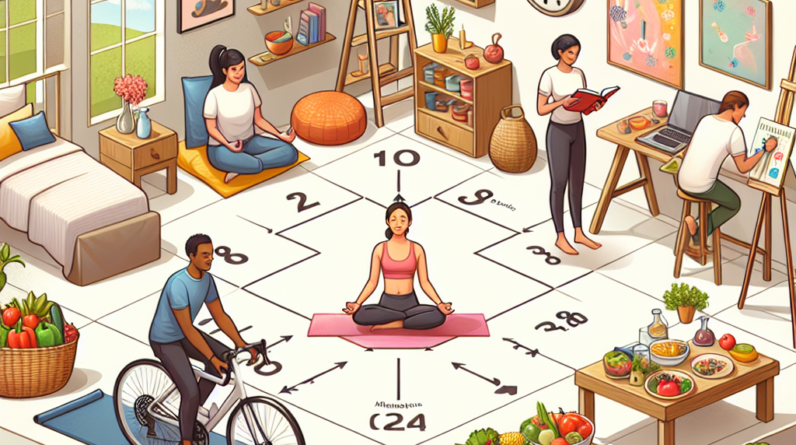
Understanding Your Stress Triggers
Recognizing Patterns
Let’s be real; we all face stress in one form or another. The first step in managing it is understanding what triggers the stress in the first place. I personally started journaling about my daily experiences, which helped me pinpoint when I felt the most anxious. Seeing those patterns on paper made things a lot clearer.
Get a Huge Discount and Bonus! Try for 90 Days Risk Free
Once you identify those moments or activities that cause stress, it allows for a proactive approach. For example, if you notice that your stress levels spike on days you have back-to-back meetings, you can look at adjusting your schedule. Setting aside time for breaks becomes a no-brainer, and trust me, it makes a huge difference.
Another thing I’ve learned is not dismissing smaller triggers. Sometimes it’s the little things—like a messy workspace or unexpected emails—that can pile up. Tackling these pet peeves early can prevent them from becoming overwhelming stressors later on.
Examining Your Reactions
What’s crucial here is not just knowing what stresses you out, but also how you react to it. I used to jump into panic mode whenever something unexpected came up, but over time, I learned the importance of taking a breath first. Practicing this pause has allowed me to respond more thoughtfully rather than react impulsively.
Next, working on my emotional responses has been key. I’ve started using techniques like deep breathing or quick meditation when stress hits—these simple practices have a transformational impact. You can keep it low-key; even just five minutes of focused breathing can do wonders.
Lastly, I find it helpful to talk about my stress triggers with friends or family. Sometimes getting an outside perspective sheds light on things I might have missed. Plus, it’s therapeutic to know you’re not alone in your struggles.
Creating a Stress Diary
This one might sound a bit cliché, but trust me, keeping a stress diary can be a game-changer. When I started jotting down daily stressors along with my feelings, I was surprised at the insights I gained. Not only did it help me identify my triggers, but it also highlighted how my mood changed based on circumstances.
What’s more, this helped build a reference point to test out coping strategies. I could clearly see which techniques worked best for me and which didn’t. This feedback loop is super important for anyone looking to manage stress over the long term.
Also, I learned to celebrate the small wins! Whether it’s managing to navigate a stressful situation calmly or just recognizing a trigger before it spiraled, writing these down kept me motivated!
Get a Huge Discount and Bonus! Try for 90 Days Risk Free
Implementing Healthy Coping Mechanisms
Physical Activity
Now, let’s talk about moving that body! I’ve found that regular physical activity is absolutely essential for managing stress. Whether it’s hitting the gym or just going for a brisk walk, getting those endorphins flowing makes a massive difference in how I feel. It’s all about finding what you enjoy; for me, it’s hitting the trails with some great beats playing!
Plus, working out serves as a brilliant distraction from daily stressors. Instead of letting my mind spiral, I focus on my breathing and movements, which really helps clear my head. Trust me; you’ll feel like a new person afterward.
Also, don’t underestimate the power of stretching. Simple stretches throughout the day—especially if you’re sitting at a desk for a while—can help relieve muscle tension and promote relaxation. I always do a few key stretches before jumping back into work, and it works wonders!
Mindfulness and Meditation
If you haven’t tried mindfulness and meditation yet, seriously, get on it! I remember being skeptical at first, thinking, “I don’t have time for that.” But even just five minutes a day can completely shift your mindset. I started with guided sessions on an app, and it felt like a breath of fresh air!
Need a Serious Energy BOOST? Huge Discount Try for 90 Days Risk Free
The beauty of mindfulness is it trains your brain to focus on the present moment instead of worrisome future thoughts. It has genuinely helped me feel more grounded. Whenever I catch myself spiraling into anxious thoughts, I take a step back, breathe, and just try to be present.
Another key element is using mantras or positive affirmations during meditation. Saying things like, “I am capable, I am strong” has really boosted my confidence and resilience. You wouldn’t believe how powerful those words can be. Give it a shot!
Connecting with Loved Ones
Building connections with family and friends plays such an essential role in stress management. I often reach out when I’m feeling overwhelmed. Those heartfelt conversations somehow lighten the load, don’t you think? Just having someone listen to you makes a world of difference.
Also, don’t forget about shared activities! Whether it’s a game night, dinner, or just a long chat, these moments foster support and laughter, both of which are incredible stress relievers. Plus, feeling connected to others combats loneliness, which can often amplify stress.
On days when stress feels crippling, I also make it a point to express gratitude for the people in my life. A simple text or call just to say ‘thank you’ can brighten my day and remind me of the support I have.
Establishing Work-Life Balance
Setting Boundaries
One of the things I struggled with the most was setting boundaries between work and personal life. It’s so easy to bring work stress home and vice versa. But once I decided to enact some firm boundaries—like shutting off work emails after a certain hour—life got a lot easier. It allows my mind to truly unwind, and I can focus on what really matters after hours.
Another helpful practice was scheduling personal time on my calendar just like I would for meetings. Giving myself permission to step away from work for a hobby or self-care made all the difference. I honestly look forward to these scheduled breaks now!
And don’t shy away from taking breaks throughout the workday, too! Whether it’s a quick coffee break or a short walk outside, stepping away can help reset your mental state. Trust me; productivity is better when you give yourself those small respites.
Prioritizing Self-Care
Self-care isn’t just a buzzword; it’s a necessity. I started to carve out time for activities that genuinely bring me joy and relaxation. Whether it’s curling up with a good book, enjoying a bath, or delving into a creative project, self-care is integral to keeping stress at bay.
Make this time sacred! No guilt allowed. Prioritizing your own well-being sends a powerful message to yourself that you matter. I’ve learned that investing time in myself recharges my energy and promotes a positive outlook on life.
Moreover, I’ve created a self-care toolkit! Some items might include candles, essential oils, or my favorite playlist that immediately calms me down. When I feel stress creeping in, I reach for this toolkit. Everyone deserves to have their ‘feel good’ resources handy, right?
Finding Flexible Work Options
Lastly, explore flexible work options if you can. After moving to a hybrid model in my job, I noticed a significant reduction in everyday stress. Being able to work from home occasionally provided me the breathing room I needed to focus without distractions.
Talking to your employer about flexible schedules or remote options might be worth considering, especially if you find traditional hours confining. I’ve had many conversations with my team about how we can structure our tasks better, and it opened up new avenues for balance.
Also, encourage open communication about workloads. When we’re able to express our preferences or needs, it lessens tension and builds a supportive environment. Let’s encourage each other to be open about what we need to perform our best!
Acknowledging When to Seek Help
Recognizing When You Need More Support
There have been times in my life when stress felt like too much to handle alone. And you know what? That’s totally okay. Knowing when to seek help is one of the most crucial aspects of effective stress management. I’ve had a couple of check-ins with a therapist, and honestly, it was a relief to be heard and guided.
It’s important to acknowledge that reaching out for professional support is a sign of strength, not weakness. Whether it’s a therapist, a coach, or a trusted confidant, getting external support can provide new strategies and insights, helping you cope better.
Also, never disregard the benefit of support groups. Sometimes hearing from others who are experiencing similar challenges reveals that you’re not alone in this journey. Sharing stories can be incredibly validating!
Educating Yourself
I’ve realized that educating myself about stress and related mental health issues has been super useful. There are countless resources out there, whether it’s books, podcasts, or online courses. Learning more has empowered me to understand my own struggles better and work towards tangible solutions.
Furthermore, exploring topics such as resilience and mindfulness has led me down paths that totally changed how I view stress. Dive into workshops or community courses. They can provide strategies you might not have considered before.
Ultimately, fostering a growth mindset around mental health can transform your perspective around stress. Treat it as an opportunity to learn about yourself rather than just a hurdle.
Utilizing Professional Resources
Finally, there are many resources available that offer professional guidance. From employee assistance programs to hotlines, they exist for a reason. I’ve utilized resources from my workplace’s EAP, and they’ve made a significant difference in my approach and outlook towards stress.
Moreover, don’t overlook community health services, which often provide invaluable resources at no or low cost. Connecting with these services can help you build a toolkit for managing stress effectively.
Incorporate what resonates with you and don’t hesitate to reach for help when you need it. Stress management is an ongoing journey, and you don’t have to do it alone!
FAQs
1. What are some signs that I am experiencing too much stress?
Common signs include irritability, fatigue, trouble sleeping, and difficulty concentrating. If you notice a change in your mood or physical health, it’s essential to take notice.
2. How can I start implementing mindfulness into my daily routine?
Start small; even a few minutes of focused breathing or a guided meditation app can help. Dedicate a specific time each day to practice, and gradually increase as you become comfortable.
3. Is it okay to seek professional help for stress management?
Absolutely! Seeking help is a proactive step towards better mental health. Professionals can provide tools and strategies tailored to your specific needs.
4. What activities can help reduce stress?
Activities like exercise, reading, spending time in nature, or even engaging in hobbies you love can greatly reduce stress levels. The key is to find what you enjoy and make time for it!
5. How important is work-life balance in managing stress?
Maintaining a work-life balance is vital. It helps prevent burnout and allows you to recharge outside of work responsibilities. Setting boundaries and prioritizing self-care are key components of achieving this balance.








